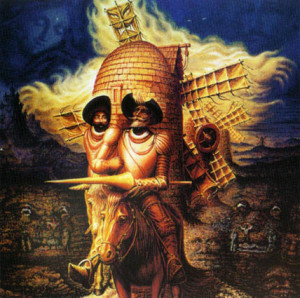Housekeeping: Okay so we decided 50pp was a little weak to meet on every week, so we decided to meet every other week instead. The next meeting will be held on the 16th in rm 35 @430pm regarding everything through chapter 21.
As a disclaimer for this post and future ones, I will quickly summarize what had happened in the preceding chapters much like the chapter headings of the actual book. I do this quickly because I want to spend as much time as possible focusing on the literary ploys and techniques, the consequences and inclinations of Don Quixote’s journey. Both my thoughts and the others reading this book are included in the body of these posts.
Here is a short synopsis of what we read:
The prologue, the sonnets and other poems, the start of our beloved Don Quixote of La Mancha and his knight’s errant, a mishap at the inn and what happened after leaving the inn, and what his fellows did to his knightly library.
Most of us read the introduction by Harold Bloom where he compares Miguel de Cervantes, the author of this book, to Shakespeare. It is safe to say that it’s both an advertisement, a very slick job by the academic H. Bloom, and genuine reading of the text. His flamboyant adjectives to describe the translation of Edith Grossman and his deflation of other monumental authors and books, i.e. Tolstoy, Joyce, Austen, Dostoevsky suggest a biased reading and a clear “buy me” pitch to the reader. However, his analysis of the differences between Shakespeare and Cervantes illuminates certain qualities giving literature the ultimate backdrop and perspective light to everything following.
Why do I say ultimate? Because in Bloom’s analysis, the two most accomplished writers ever to have existed where Shakespeare and Cervantes. And if one were to pin these two figure up in a battle, Cervantes would win out. According to Bloom, Cervantes is less in shadows than Shakespeare. Shakespeare was private; no one knew his identity, and Cervantes was in the public eye, imprisoned, tortured, and cast aside.
In this light Cervantes wins out. He wins because he is upfront about the narrative in the book, which I will go into more detail later. On the other hand we are constantly trying to find Shakespeare in his plays. Cervantes deliberately places himself in the narrative. He very clearly ridicules those he knew in real life. It is said by Bloom that everyone Quixote knew and everything he experienced is in this book. And he does not hide away from it either.
The main topic I want to discuss within these first 50 pages (there are many I could choose from) is the burning of Don Quixote’s library and how Cervantes inserts himself into the text.
Early on in the book, Cervantes shows us a burning scene of supposedly bad books. These books are from Don Quixote’s library and are the very books that had driven him mad. His servants and fellows were so shocked by the state of their master, they decide to burn the very books that caused this madness. At the very end of the chapter, Cervantes inserts one of his own books into the story line, saved from the fire the priest says, “This Cervantes has been a good friend of mine for many years, and I know that he is better versed in misfortunes than in verses,” (52). It is easy to see this tactic as simply gaining authority over the narrative. By inserting himself in relation to the priest who knew Don Quixote so much as to burn his books, the author of this text is given a level trustworthiness that allows the skeptical reader to suspend their disbelief.
The implications of such a tactic are deceivingly huge. At first sight it seems a small play. It would be easy to read right over it as nothing more than the author having fun. However, we can see what Bloom was talking about in the introduction within these few sentences. Bloom shares with us that Cervantes is everywhere. And here within the above quote we get Cervantes naming himself, then sharing a biographical note about the trails he had gone through in life. Remember? the quote says, “he is better versed in misfortunes than in verse.” What this says is Cervantes himself was no academic. He did not spend idle hours picking daisies from the grass on a sun drenched prairie under a tree. He was not a rich man, unlike Shakespeare. This of course doesn’t make Cervantes better, but it shows the up front characteristic of this novel rendering it timeless in a very significant way.
The question arises: how can a text so old relate to us today? I would say more so than most contemporary novels. The context in which Don Quixote’s books were being burned is as I mentioned earlier that his friends at home were so frightened by Don Quixote’s maddened state they decided to burn the very books that drove him insane. Essentially, they burnt all of the bad literature in the house. Of the times in 1605, the literature they burnt would be the equivalent to our reality TV, Soap Operas, High School Musical 2 and 3, bad YouTube videos, judgmental blogs, Cosmopolitan Magazine.
More over, they refer to these chivalric novels as “having melted our master’s brain.” Does this ring any bells? Do any of us recall the way our mother or father told us not to sit too close to the TV; to stop playing video games that are brains would turn to mush? I sure do.
Let’s not make the mistake of Cervantes’s intention here. Cervantes, in my opinion, doesn’t wish to banish all bad novels. If Cervantes did want to banish all bad literature from this earth than he would have had the priest and barber burn all of Quixote’s books. Instead, they keep the core essentials to remind them of the traces of a valiant style that was overdone and overwritten during his time.
As an aside, I don’t think Cervantes had what it took to burn an entire collection based off it’s effect on Quixote. No, in fact, I think Cervantes would agree that it is important to keep record of all different types of literature and art, including TV, Movies, Plays, and Books of all forms, just so there is a record and a tradition kept alive. Because art is the marking, or deep cave painting, of what we humans did while we were here both as an individual and species.
As a musing, isn’t it funny how art is both attributed to individual, to the culture, then to the world?
Back to the burning scene: the mere fact they selected a few books to save proves the complete opposite of banishing a seductive literature. What Cervantes suggests in 1605, is a conversation that we are having here and now in a much amplified form. The conversation and debate around social media and entertainment and what it’s consequence is to our humanness. Cervantes is perhaps documenting the first account of an entertainment taking a negative toll on the human spirit. He warns us of this impulse to indulge our desire for more.
It is said numerous times in these opening pages that Quixote read and read and read the same story over and over again. He knows these narratives by heart and can recite them from memory without a single misquote. He is overtaken and swallowed by the book’s escapism. And Don Quixote has gone all the way, and there’s over 900 more pages to find out how returns to the simpleton he once was.
Next time, we’ll talk about insanity, reality, and The Knight of the Sorrowful Face.

